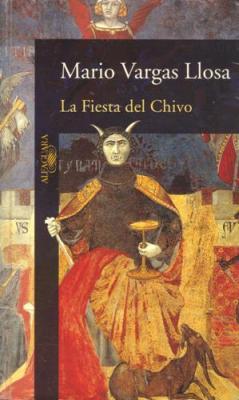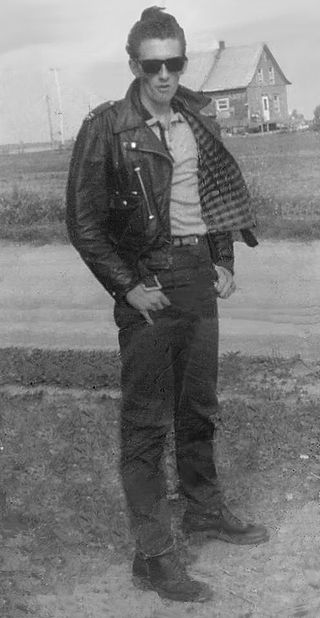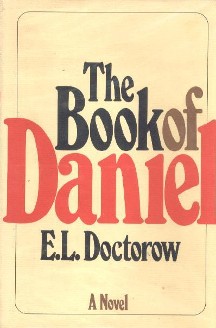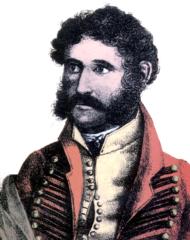Feminist literary criticism is literary criticism informed by feminist theory, or more broadly, by the politics of feminism. It uses the principles and ideology of feminism to critique the language of literature. This school of thought seeks to analyze and describe the ways in which literature portrays the narrative of male domination by exploring the economic, social, political, and psychological forces embedded within literature. This way of thinking and criticizing works can be said to have changed the way literary texts are viewed and studied, as well as changing and expanding the canon of what is commonly taught. It is used a lot in Greek myths.

The Feast of the Goat is a novel by the Peruvian Nobel Prize in Literature laureate Mario Vargas Llosa. The book is set in the Dominican Republic and portrays the assassination of Dominican dictator Rafael Trujillo, and its aftermath, from two distinct standpoints a generation apart: during and immediately after the assassination itself, in May 1961; and thirty-five years later, in 1996. Throughout, there is also extensive reflection on the heyday of the dictatorship, in the 1950s, and its significance for the island and its inhabitants.
Postmodern literature is a form of literature that is characterized by the use of metafiction, unreliable narration, self-reflexivity, intertextuality, and which often thematizes both historical and political issues. This style of experimental literature emerged strongly in the United States in the 1960s through the writings of authors such as Kurt Vonnegut, Thomas Pynchon, William Gaddis, Philip K. Dick, Kathy Acker, and John Barth. Postmodernists often challenge authorities, which has been seen as a symptom of the fact that this style of literature first emerged in the context of political tendencies in the 1960s. This inspiration is, among other things, seen through how postmodern literature is highly self-reflexive about the political issues it speaks to.

Greasers are a youth subculture that emerged in the 1950s and early 1960s from predominantly working class and lower-class teenagers and young adults in the United States and Canada. The subculture remained prominent into the mid-1960s and was particularly embraced by certain ethnic groups in urban areas, particularly Italian Americans and Latino Americans.
The Autobiography of Miss Jane Pittman is a 1971 novel by Ernest J. Gaines. The story depicts the struggles of African Americans as seen through the eyes of the narrator, a woman named Jane Pittman. She tells of the major events of her life from the time she was a young slave girl in the American South at the end of the Civil War.

The Book of Daniel (1971) is a semi-historical novel by E. L. Doctorow, loosely based on the lives, trial and execution of Julius and Ethel Rosenberg. Doctorow tells the story of Paul and Rochelle Isaacson through the persons of their older son, Daniel, and his sister, Susan, who are college students deeply involved in 1960s politics.

The Master is a novel by Irish writer Colm Tóibín. His fifth novel, it received the International Dublin Literary Award, the Stonewall Book Award, the Lambda Literary Award, the Los Angeles Times Novel of the Year and, in France, Le prix du meilleur livre étranger in 2005. It was also shortlisted for the 2004 Booker Prize
David William Rabe is an American playwright and screenwriter. He won the Tony Award for Best Play in 1972 and also received Tony Award nominations for Best Play in 1974, 1977 (Streamers) and 1985 (Hurlyburly).
The Years of Lyndon Johnson is a biography of Lyndon B. Johnson by the American writer Robert Caro. Four volumes have been published, running to more than 3,000 pages in total, detailing Johnson's early life, education, and political career. A fifth volume is expected to deal with the bulk of Johnson's presidency and post-presidential years. The series is published by Alfred A. Knopf.

Kevin Boyle is an American author and the William Smith Mason Professor of American History at Northwestern University. His 2004 book, Arc of Justice: A Saga of Race, Civil Rights, and Murder in the Jazz Age, won the National Book Award.

The counterculture of the 1960s was an anti-establishment cultural phenomenon that developed in the Western world starting in the mid-1960s, and continued until the early 1970s. The effects of the movement have been ongoing to the present day. The aggregate movement gained momentum as the civil rights movement in the United States had made significant progress, such as the Voting Rights Act of 1965, and with the intensification of the Vietnam War that same year, it became revolutionary to some. As the movement progressed, widespread social tensions also developed concerning other issues, and tended to flow along generational lines regarding respect for the individual, human sexuality, women's rights, traditional modes of authority, rights of non-white people, end of racial segregation, experimentation with psychoactive drugs, and differing interpretations of the American Dream. Many key movements related to these issues were born or advanced within the counterculture of the 1960s.

The Latin American Boom was a literary movement of the 1960s and 1970s when the work of a group of relatively young Latin American novelists became widely circulated in Europe and throughout the world. The Boom is most closely associated with Julio Cortázar of Argentina, Carlos Fuentes of Mexico, Mario Vargas Llosa of Peru, and Gabriel García Márquez of Colombia. Influenced by European and North American Modernism, but also by the Latin American Vanguardia movement, these writers challenged the established conventions of Latin American literature. Their work is experimental and, owing to the political climate of the Latin America of the 1960s, also very political. "It is no exaggeration", critic Gerald Martin writes, "to state that if the Southern continent was known for two things above all others in the 1960s, these were, first and foremost, the Cuban Revolution and its impact both on Latin America and the Third World generally, and secondly, the Boom in Latin American fiction, whose rise and fall coincided with the rise and fall of liberal perceptions of Cuba between 1959 and 1971."

The dictator novel is a genre of Latin American literature that challenges the role of the dictator in Latin American society. The theme of caudillismo—the régime of a charismatic caudillo, a political strongman—is addressed by examining the relationships between power, dictatorship, and writing. Moreover, a dictator novel often is an allegory for the role of the writer in a Latin American society. Although mostly associated with the Latin American Boom of the 1960s and 1970s, the dictator-novel genre has its roots in the nineteenth-century non-fiction work Facundo (1845), by Domingo Faustino Sarmiento. As an indirect critique of Juan Manuel de Rosas's dictatorial régime in Argentina, Facundo is the forerunner of the dictator novel genre; all subsequent dictator novels hearken back to it. As established by Sarmiento, the goal of the genre is not to analyze the rule of particular dictators, or to focus on historical accuracy, but to examine the abstract nature of authority figures and of authority in general.

After This is a 2006 novel by award-winning American author Alice McDermott. The novel follows a working-class American family who reside on Long Island, New York and their four children, who are enduring their own experiences during the times of the sexual revolution. It is set during the mid-20th century, a time after the end of World War II, through to the presidency of Richard Nixon.

Andrea Rita Dworkin was an American radical feminist writer and activist best known for her analysis of pornography. Her feminist writings, beginning in 1974, span 30 years. They are found in a dozen solo works: nine books of non-fiction, two novels, and a collection of short stories. Another three volumes were co-written or co-edited with US Constitutional law professor and feminist activist, Catharine A. MacKinnon.

Lady of the Forest: A Novel of Sherwood is a 1992 historical fiction novel by American author Jennifer Roberson. A re-telling of the Robin Hood legend from the perspective of twelve characters associated with the legend, the story centers around English noblewoman Lady Marian FitzWalter's encounters with Lord Robert of Locksley and his scheming rival the Sheriff of Nottingham amid the backdrop of Prince John's schemes – he aims to increase his own wealth and power at the expense of post-Conquest England and his brother, King Richard.

Arc of Justice: A Saga of Race, Civil Rights, and Murder in the Jazz Age is a 2004 book by historian Kevin Boyle, published by Henry Holt. The book chronicles racism in Detroit during the 1920s Jazz Age through the lens of Ossian Sweet, an African American doctor who moves to Detroit during the great migration. While living in Detroit he eventually moves out of the ghetto and he and his wife move into an all-white middle-class neighborhood. When racist whites attack the Sweets' home, a white man is killed. Sweet and his family are persecuted by the legal system.

Bitter in the Mouth is a 2010 novel by Vietnamese-American author Monique Truong. The novel is written in a stream of consciousness narrative structure and follows the character of Linda Hammerick as she comes of age. Linda remembers her childhood in Boiling Springs, North Carolina, in the 1970s and her relationships that follow, through college and beyond. Her present mingles with her past as she learns of her heritage and deals with death, sexual abuse, cancer, adoption, unwanted pregnancies, and family issues. Throughout all of these experiences, Linda lives with a secret extra sense, the ability to taste words, which she later discovers is a form of synesthesia.

These Truths: A History of the United States is a one-volume book of American history written by award-winning historian and New Yorker writer Jill Lepore. It traces American politics, law, journalism, and technology from the Age of Discovery through the present day, focusing on America's founding truths and their role in uniting, dividing, and transforming the nation. These Truths was published by W. W. Norton in September 2018.
Jennifer Szalai is the nonfiction critic at The New York Times. Szalai was born in Canada and attended the University of Toronto, studying political science and peace and conflict. She also holds a master's degree in international relations from the London School of Economics.













